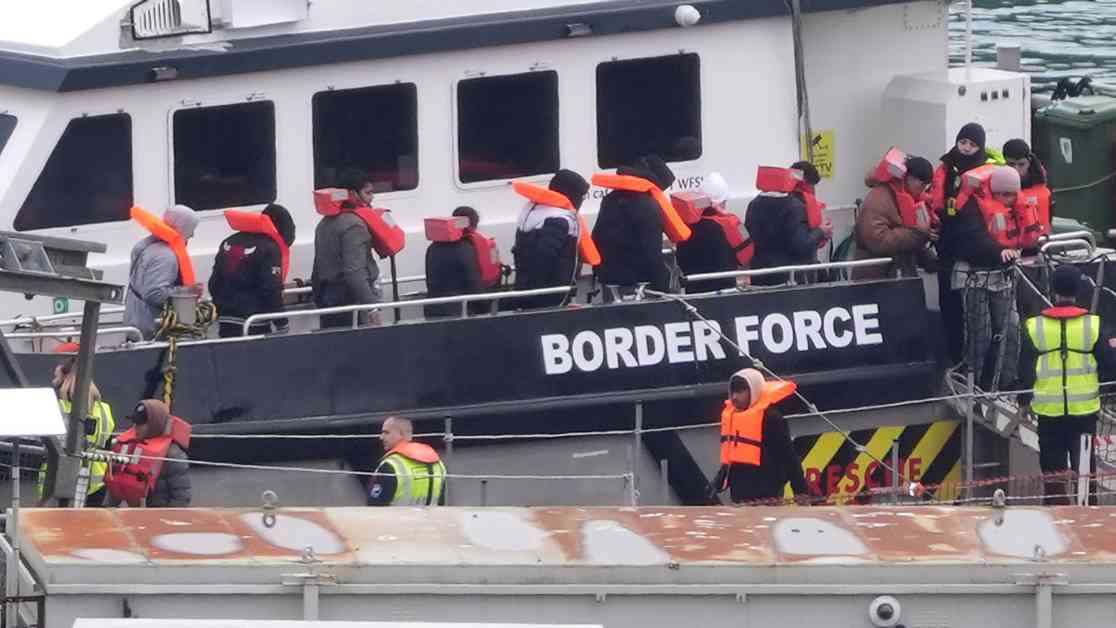The British government has recently reallocated £75 million from the scrapped Rwanda plan to finance the new Border Security Command, signaling a significant investment in border security measures. This move comes as part of an immigration “crime crackdown” initiative led by Home Secretary Yvette Cooper, aiming to enhance law enforcement efforts against smuggling and trafficking activities to bolster overall border security.
Funding provided by the immediate cash injection will be utilized for the procurement of new covert cameras and monitoring technology, as well as the recruitment of additional staff within the Border Security Command (BSC). The Home Office has highlighted that these resources will also support the establishment of a new unit dedicated to improving intelligence collection across UK police forces and enhancing information sharing with relevant partners. Moreover, the influx of funds will contribute to increasing the number of prosecutors within the Crown Prosecution Service, further strengthening the legal framework to combat criminal activities at the border.
The decision to redirect funds from the Rwanda scheme, which was initially introduced by the previous Conservative government to deter migrants from crossing the English Channel in small boats, reflects Prime Minister Sir Keir Starmer’s commitment to prioritizing border security measures. Upon assuming office in early July, the Labour administration promptly discontinued the Rwanda plan, with Home Secretary Yvette Cooper initiating an audit to assess the financial implications of commitments made by the previous government.
One estimate suggests that the Rwanda scheme could have amounted to approximately half a billion pounds by April 2027, prompting the government to reevaluate its allocation of resources in favor of bolstering border security efforts through the Border Security Command. This strategic shift aligns with Labour’s electoral promise to allocate £75 million annually to the BSC, with the overarching goal of combatting criminal syndicates engaged in smuggling and human trafficking activities that pose a threat to national security.
Yvette Cooper emphasized the necessity of disrupting criminal networks that exploit vulnerabilities in border security, stating, “Criminal gangs are getting away with undermining our border security and putting lives at risk.” The Border Security Command is poised to spearhead a comprehensive overhaul of law enforcement strategies to dismantle these illicit operations and safeguard the integrity of the nation’s borders. By leveraging state-of-the-art technology and enhancing intelligence capabilities, the BSC aims to utilize all available tools to combat the insidious trade conducted by these criminal entities.
As part of the funding uplift for the Border Security Command, key law enforcement agencies such as the National Crime Agency (NCA) and the police will receive substantial financial support to bolster their capabilities in combating people-smuggling networks operating in the English Channel. Rob Jones, the Director General of Operations at the NCA, expressed that the additional funding will enable the agency to enhance its technological infrastructure, data analysis capabilities, and operational capacity, both domestically and internationally.
The government’s decision to prioritize border security through the reallocation of funds underscores a concerted effort to fortify the country’s defenses against transnational criminal activities that exploit vulnerabilities in the border control system. By investing in cutting-edge technology, intelligence gathering mechanisms, and law enforcement personnel, the Border Security Command aims to disrupt illicit smuggling operations and safeguard the nation’s borders from external threats.
Enhancing Border Surveillance and Monitoring
In light of the evolving landscape of criminal activities at the border, the government’s allocation of funds towards new covert cameras and monitoring technology signifies a proactive approach to enhancing surveillance capabilities. These advanced tools will enable border security authorities to effectively monitor border crossings, identify potential threats, and respond swiftly to emerging security challenges. By leveraging the latest technological innovations, the Border Security Command aims to establish a robust surveillance infrastructure that can effectively track and intercept illicit activities along the border.
Strengthening Intelligence and Information Sharing
The establishment of a new unit dedicated to improving intelligence collection and enhancing information sharing among UK police forces and partner agencies underscores the importance of collaboration in combating cross-border criminal activities. By streamlining the flow of intelligence and coordinating efforts across various law enforcement entities, the Border Security Command aims to enhance situational awareness, identify criminal networks, and disrupt their operations effectively. This collaborative approach will empower authorities to proactively address security threats and safeguard the integrity of the nation’s borders.
Empowering Law Enforcement Agencies
The infusion of additional funds to support the National Crime Agency (NCA), the police, and other law enforcement partners signifies a commitment to empowering these agencies with the necessary resources to combat organized crime syndicates involved in people smuggling and trafficking. By providing financial support for technological upgrades, capacity-building initiatives, and international cooperation efforts, the government aims to enhance the operational effectiveness of these agencies in tackling transnational criminal activities. This strategic investment underscores a holistic approach to border security that prioritizes cooperation, innovation, and proactive law enforcement measures.













